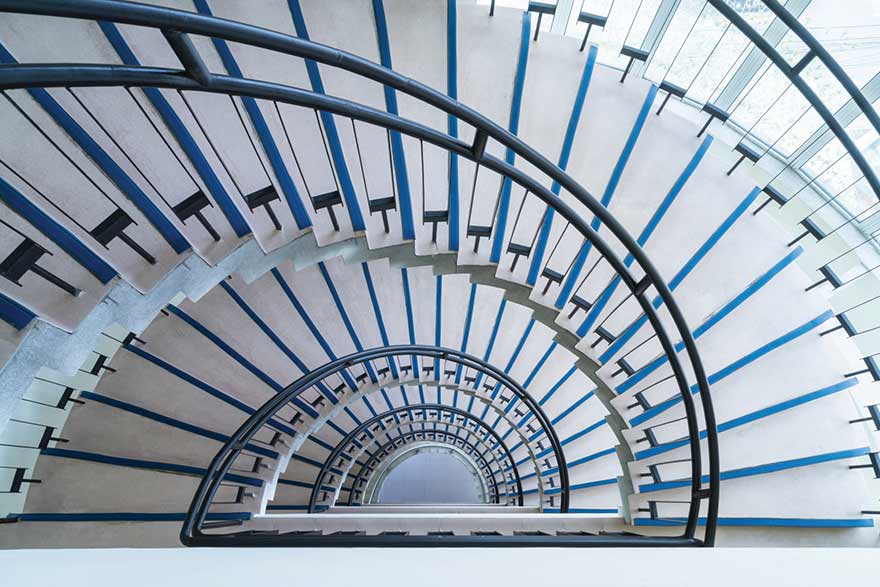Seven respondents to our survey offer seven answers to the question of what we will do with culture and with ourselves. None of them are reassuring, but all offer enough space to seek an answer
Are we teetering on a bare ledge or in the forests of something that, rightly or not, we call culture and art?
CorD’s interlocutors offer thought-provoking material that follows and precedes every listing of the repertoire of the cultural events ahead of us.
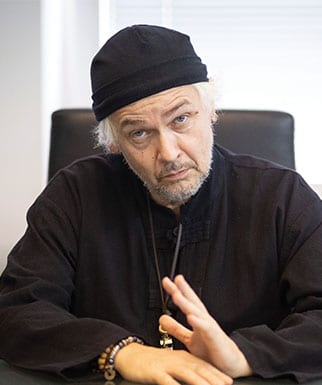
Ivan Tasovac
Director of the Belgrade Philharmonic and Former Culture Minister
New Narrative for a New Generation
Digital anarchy has – in parallel with trash – brought us top artistic contents. Failure to consider this juncture, which is important for culture, most often represents classical grouchiness arising from artistic weakness. The Belgrade philharmonic has a better answer than that
Although we live in a time when trash is ubiquitous and, above all, easily accessible – both for provincial consumption and for the no less provincialism of public outrage – it is unlikely that anyone will bring into question, even 250 years after the fact, that Ludwig van Beethoven became/remained one of the greatest influencers in the business that we, out of grace, call culture and art.
It will probably sound paradoxical, but there’s never been a better time for culture and art. And that’s precisely because of digital technologies which we – sometimes justifiably, but sometimes too lightly – declare the main culprits for the domination of aggressive uncultured behaviour in public discourse. Without the internet and social networks, Ludwig van Beethoven and his music wouldn’t be available to the broadest possible audience today. Without this, his influence – as was the case in the past – would remain within the narrow circle of professionals or dedicated fans. And the marking of the anniversary of his birth probably wouldn’t be a planetary event.
And so digital anarchy, along with trash and various other monstrosities, also brought us top-notch artistic contents. The promoting and consuming of top culture has never had an easier path to the end-user, whether they are in New York or Zvonačka Banja. It’s an exclusively personal choice whether you use the internet as a treasure trove of knowledge and cool stuff, or as a pornographic search engine.
It’s an exclusively personal choice whether you use the internet as a treasure trove of knowledge and cool stuff, or as a pornographic search engine. We give you the 2019/20 #followbeethoven season
If you are aged at least 18, both are legitimate choices. If you are a minor, I hope that in some break from the gloom and murdering of optimism with grouchiness caused by the twilight of a civilisation, you will discover that YouTube is the largest library of classical music that we couldn’t have dreamt of just a few years ago.
I recall my student days and how I spent weeks, sometimes months, in order to get recordings of Horowitz, Glenn Gould or Rachmaninoff – recordings that are available today at a single click, for free. Failure to consider this juncture, which is important for culture and this aspect of our reality, most often represents classical grouchiness arising from artistic weakness, or as a result of personal inability or idleness.
That’s why the 2019/20 season, #zapratibetovena [#followbeethoven], is an important first step with which the Belgrade Philharmonic begins creating a different narrative that’s needed for new generations to understand – not only the authors of today’s anthem of the European Union but also other great figures of the classical music scene.
For our full-time subscribers, devotees to the concert scene, with whom we share a fascination with the best pages, conductors and soloists of timeless music every week, a new narrative is probably superfluous, but it is essential when looking at the broader picture and future of culture.

Jasna Dimitrijević
Director of the Kolarac Foundation, President of the Management Board of the National Theatre
Many Sometimes Say Too Little
I don’t have the impression that culture is important in our society as a factor that influences the raising of awareness of a better quality of life. The number of contents we create doesn’t mean anything if they don’t influence changes in attitude or the gaining of new experiences, and don’t encourage critical thinking with regard to reality
The question is whether it suits us, through entertainment, as an illusion of culture, to stifle any kind of engagement and rebellion, to reconsider reality or encourage creativity and critiques of society, as factors of progress and development?
Culture is like an umbrella that covers various phenomena, and symbolic practises. A set of mindful and imaginative works that recorder and recall human thoughts and experiences in various ways. That which is the best in thinking and creating. Culture is the most comprehensive critique of society in all of its aspects. Culture is a rebellion against hatred, lust, evil, lies and injustice.
In the name of striving towards and recognising the need for communication, mutual respect, understanding, we are endeavouring to make the world better and more just than it is. It is through the culture that taste and a system of values are formed, one learns more than has been enabled by the education system, developing a critical awareness of the time in which we live. That is is crucial in the development and advancement of society.
On one side, the place of culture is determined by cultural policy, through the work of institutions, education, support to civil society in culture and artists, while the key on the other side is the audience and on the third side is the media.
When artists are creating their works and cultural institutions, when they are creating their contents, they must consider the audience that they are addressing. The audience today is everything but a homogeneous structure that’s addressed in one direction. The audience seeks an opportunity to participate in the creative process, to change the flow of elaborating a work and for there to be a close relationship between the artist and the audience.
In the context of the technological revolution, we are witnessing the almost complete individualisation of the needs and possibilities of the personalised choice of content, values etc. In such a model, classical institutions of culture become places that must take into account the tendencies and habits of the global audience, and – in creating their programmes – must encourage critical thinking, create space for new experiences, develop the need for communication, educate and influence lifestyles and life habits.
I don’t have the impression that culture is important in our society as a factor that influences the raising of awareness of a better quality of life. Culture isn’t dominant in defining the kind of society we want and the values we care about. The number of programmes, events and festivals does not mean anything if these contents don’t influence changes in attitude and the gaining of new experiences and if they don’t encourage critical considerations of reality.
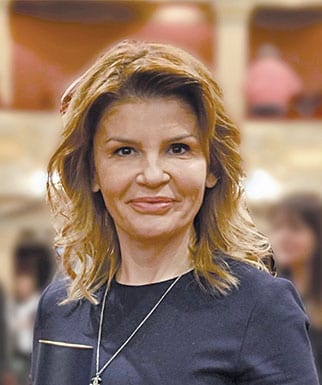 Jelena Trivan
Jelena Trivan
Director And Editor-in-chief of the Official Gazette, Chair of the Board of Directors of the Film Centre of Serbia
Mistaken Messiahs
A new phenomenon of false dissidence is emerging in Serbia, in which artists participate in political struggles, rather than ideological or social ones, with the aim of changing their own position and not the world. It isn’t their works that are engaged, rather them personally
From the dilemma over whether art dares only be about satisfying the need for the beautiful or whether it must have a deeper impact on society, the new millennium and the influence of the electronic media have brought a new dilemma – whether culture has actually become equal to entertainment. This dilemma includes one dangerous assumption – that culture if it is proper, cannot be entertaining, which pushes people away from it, and that entertainment necessarily carries within it the assumption of cheap, raw enjoyment.
If we return to the origins of culture’s emergence, we will recall that it was created together with the emergence of leisure time and the need for people to find additional spiritual content within that. As such, it must awaken in people a sense of satisfaction, but beyond that also a consideration and a need to act. The ancient philosophers feared the power of art to diminish or destroy the fear of the gods among people. Thus, they considered it a powerful instrument with which human consciousness changes. And that’s indeed what it is.
However, the moment the artist thinks that his personal rebellion has the power to change the world he has become deluded in a way that Jean-Paul Sartre best defined in writing about committed literature: “That literature reveals to readers their own personal situation so that they can take responsibility for it”. Thus, the artist isn’t the Messiah leading the unaware, rather the work of art itself carries within it the awareness that leads people to change themselves and their deeds if they so desire.
Why is that important today? Because the world has become filled with great artists with minor works, whose appearance as a phenomenon is greater than their art. A new phenomenon of false dissidence is emerging in Serbia, in which artists participate in political struggles, rather than ideological or social ones, with the aim of changing their own position and not the world.
The irony is complete due to the fact that it isn’t their works that are engaged, rather them personally. That’s why entertainment rules, because art – primarily theatre, film and literature – cannot recognise the real dreams, needs and hopes of today’s man, who doesn’t think about Kosovo or boycotting elections, but rather about a lack of intimacy in times when people don’t have time for anything.
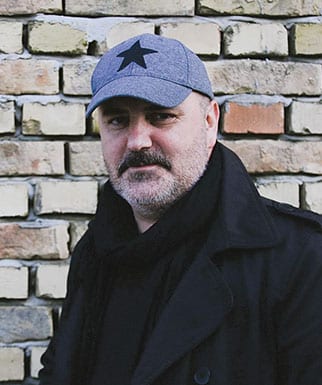 Kokan Mladenović
Kokan Mladenović
Theatre Director
How to Distance Oneself From Zero?
The zero that starts with the amount of funding earmarked for culture – 0.62% of our state’s total budget – is no accident. It is there as a representation of a cross-section of the knowledge, education, culture, upbringing and awareness of those who make decisions in our country
The place of culture is clearly determined by voting in the National Assembly of the Republic of Serbia, or – more precisely – with the adopting of the budget for the current year, which envisages 0.62% of the total budget of our country for culture. The place of culture in that country starts from zero! That zero is not accidental. It is carefully designed. It is there as a representation of a cross-section of the knowledge, education, culture, upbringing and awareness of those who make decisions in our country.
When you draw a line under their fake diplomas, media illiteracy, the censoring of all critical and free-thinking considerations, when you add and subtract their illegal projects, like the Belgrade Waterfront, when you count the dead workers who perished in their Tutankhamun-ization of Serbia, when their attitude is summed up towards cultural housing, the culture of communication, the culture of tolerance and culture in the narrower, broader and every other sense, you end up with one big zero.
Everything that’s multiplied by that zero becomes zero. Anyone who adds up their zeros will eventually be stripped of their essential culture. Everything that starts with zero also ends with zero. While zeroes decide about us – we will always be zeroes. There is simply no place for culture there. Culture despises lies, aggression, a lack of arguments and a lack of freedom in every sense. Thus, one must fight for culture. By minimising all of the foundations of their system of non-culture, or their villas, whichever pleases you.
 Milena Minja Bogavac
Milena Minja Bogavac
Director of the Šabac Theatre
A New Culture Will Engulf Us
It seems that there’s no place for culture in an atmosphere like this, but that’s not so. Free citizens, participants in public and cultural life, must struggle and fight for the values they care about
In response to the question of where the place of culture is in Serbia, it is impossible to give a single and correct answer.
All answers are correct, which is the same as them all being wrong… that’s because the culture is never a unique and homogeneous notion. Culture is everything that man preserves and cultivates, and Serbia is a country where plums are cultivated – because of rakija brandy, and pigs – because of roasting… and many other more complex things, but to a much smaller extent.
If we define the notion of culture through the notion of art, things only become a little simpler: artists are, for the most part, at counters; of the National Employment Services Bureau, or somewhere where they write projects and make budgets, and then compile narrative and financial reports.
They don’t have too much time left to deal with art… and if they were lucky enough to gain employment at an institution, they seem to haven’t forgotten about art while waiting at the counter. They dropped it while queuing. Now they’re waiting again – for their salary, and that salary is miserable and low, so they quickly come to the conclusion that working isn’t worth their while. They “process”, which isn’t the same as actually working… Simultaneously, some new cultures are flourishing.
Turbo-folk culture has reached the degree of complex eclecticism of late postmodernity. Tabloid culture is served alongside all three meals, at every news-stand, on every front page and all TV channels. Reality culture has entered every home, so the chaplains complain about how that impacts badly on children and young people because they don’t see that it actually impacts on the elderly the worst.
Kids have their own culture. The children have long been on YouTube. They record clips that adults don’t understand, and just because they don’t understand it, they say “that’s not culture” … And the thing is, in fact, very complex, because the old, good culture has been destroyed by censorship and self-censorship, and another, new culture passes under the radar and under the guard of the so-called “cultural elite”. I believe in that!
While we conduct boring conversations about the general places of high art and clashes of the traditional and the contemporary, behind my back, I cross my fingers childishly for the counter-culture. I hope they will fly in like Barbarians entering Rome and that we quickly won’t know what hit us! We don’t deserve any better, because the story of culture is always like that old American story of the two wolves: it isn’t the good or the evil one that will win, but rather the one you feed more. The culture we were taught in school has intentionally been left to die of starvation. In its place will come something that nobody taught us about and it will be fun to see what happens afterwards… if there will be any survivors and those who know how to see.
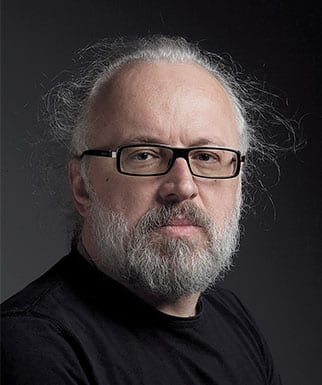 Zoran Đerić
Zoran Đerić
Director of the Serbian National Theatre in Novi Sad
Between Two Extremes
If we couch rebellion in elite culture, it will be harmless because its audience is small. If it were in mass culture, it would cause concern among those against whom it is directed. Everything in our country is between those two extremes
If you insist on one (entertainment) or other (rebellion) definition of culture, then you reduce it to the trivial, in the first instance, or you attach more importance and power to it, in the other. There are elements of entertainment in culture, but it isn’t good if entertainment is the end in itself, as that belongs more to so-called subcultures. There are also elements of rebellion in culture, but that belongs more to that which is called counterculture, while it can also be pseudo-culture when culture is just a mask, a shell for hiding real intentions or goals.
Thus, we can talk about real and fake culture. Due to forgeries, concealment, illusion, it is difficult to really recognise her true face. When I believe that culture is an urgent need, then it seems commonplace. I don’t come across as convincing, because in our country everyone deals with culture, recognising and defining it, both where it exists and where it doesn’t. That also applies to how it is financed, mostly weakly and insufficiently, and they expect a lot and even too much. It is presumably expected that each individual, in accordance with their own needs, will participate in the financing. That’s why we have the dominance of trivial cultures.
In our country everyone deals with culture, recognising and defining it, both where it exists and where it doesn’t. That also apples to how it is financed, mostly weakly and insufficiently, and they expect a lot and even too much
Paradoxically, they are the cheapest forms and generate the most profit. The most expensive are so-called elite cultures, while the income from them is the lowest. Let’s take, for example, an opera. Its realisation, for instance, with us at the Serbian National Theatre in Novi Sad, requires the participation of several hundred people, from artistic ensembles (choir and orchestra), via soloists, conductors and accompanying staff, to the necessary technical requirements (from the creation of costumes, sets and props, to stage setting).
Add to that, royalties, material costs and other expenses, and you will get one piece of art, an opera, which has its own audience, but that audience cannot and does not cover all the costs, so they can’t gain a return even when the hall is full. And that isn’t even expected in our country because art is always donated by the state.
The example is similar with other expensive arts, such as ballet, but even dramatic plays aren’t cheap, as a great spectacle requires great investment, while expectations are also high, and the results – they are sometimes lacking, or not at the level that would rank them among top artistic works. With the most common excuse being that not enough money was invested.
Paradoxically, the elite culture needs excuses, i.e. monetary, while mass culture receives that money because it offers a good time and doesn’t pose questions. And where is the place for the rebellion? If it is in the former, then it is harmless, almost invisible, because it is exposed to only a few consumers. If it is in the latter, then it would cause concern amongst those against whom it is directed. With us, everything is in between these two extremes.
 Zoran Hamović
Zoran Hamović
Director and Editor-in-chief of Publishing Company Clio and President of the Association of Professional Publishers of Serbia
Rebellion is a Working Task
While we conduct boring conversations about the general places of high art and clashes of the traditional and the contemporary, behind my back, I cross my fingers childishly for the counter-culture. I hope they will fly in like barbarians entering Rome and that we quickly won’t know what hit us!
Culture is always rebellion, the production of a new world. There is no kind of dilemma in that. Entertainment is the consuming of culture. Rebellion is expensive for the individual, because as a rule, it turns them into a victim, just as entertainment does to a society. The ruling Serbian politics has a cheap showbiz character, and the society is orientated towards continuous amusement. This is about subjugating the audience with the lowest human urges, manipulation for the consolidating power, and not for advancing the life of the community. Cheap entertainment is the field where populist authorities and voters most like to meet and do so the most. Populist politics, therefore, equate culture and entertainment.
Now we also have official confirmation that Serbian society is becoming an anti-intellectual environment. With the recent ‘decree’ of the incumbent Serbian president, intellectuals have been clearly declared as quasi-elite and opposed to plebs, which translates as “my people”. Critical thought is forbidden, and intellectuals are brought before the people’s court.
At the same time, a new elite is being proclaimed and deployed. It is an elite composed of firefighters, chauffeurs, bus conductors, undergraduates, complete idiots, water meter readers and tilers, who – on average – have been able to graduate and earns their masters and doctorates in just two years. A strong stimulus of ignorance and wild ambition yielded faster, stronger and better results. Instead of encouraging originality and intellectual abilities, weaknesses are favoured, with stronger reproductions, plagiarism, party ownership over the results of others.
The ruling Serbian politics has a cheap showbiz character and the society is orientated towards continuous amusement
Those who are the most deserving and most significant in culture are being discredited by the media as unnecessary and incompetent. The totalitarian pattern of behaviour in which culture becomes a victim of political entertainment – the hysterical robotic production of subservience and obedience – is consolidating gradually but noticeably. It has culminated in the language of simplicity and primitivism in media expression, and become a significant factor in anti-cultural pedagogy for both young people and adults.
A large number of regime-friendly print and electronic media, spreading the infestation of more dangerous entertainment and products of an atmosphere of ‘reality’ that extol corruption, prostitution and crime. It seems that there’s no place for culture in an atmosphere like this, but that’s not so.
The majority of cultural creators express their determination towards events in society and culture with critical expression; they are incorruptible and don’t allow themselves to be undermined. We know that the elite is composed of free citizens, participants in public and cultural life who must struggle and fight for the values they care about. But we also know that the silence of the intellectual and cultural elite is inexcusable. Rebellion is a continuous working task and the meaning of its existence.
